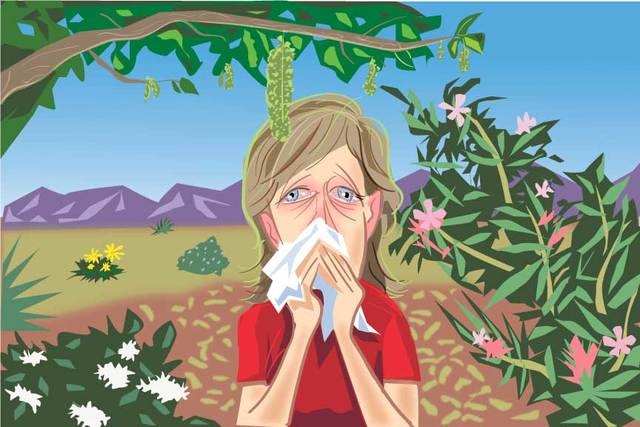Las Vegas’ climate sets the stage for allergy problems
As pretty as it is to have nature in full bloom, with the new trees and budding flowers come a full season of allergies — runny nose and all.
But Dr. Joel Katz, an allergy specialist at the Allergy &Asthma Center, has suggestions for coping with the season.
Las Vegas’ climate sets the stage for allergy problems, Katz says. “We had rain early on. Now we are in a long dry period.”
Katz says if there is rain during the time trees and other plants begin to bloom, the moisture can help clear out the pollen that triggers allergies.
Although he doesn’t think Las Vegas will have a longer allergy season than normal, there might be more allergens to be aware of.
“It’s not necessarily longer seasons,” Katz says. “Trees tend to pollinate like clockwork. They seem to peak at the same time.”
He adds that because of global warming and increased carbon dioxide in the air, there has been a higher pollen count nationally.
Contributing to the problem locally, many of the trees in Summerlin and Green Valley in Henderson, which were small at planting, have grown larger. So they’re producing more pollen as those communities mature.
So what to do?
Katz says it can start with simple tips and lifestyle adjustments.
“Keep your windows closed at home or in your car,” he says. “Don’t leave your clothes outside to dry.”
He also says there is a higher pollen count in early morning.
“So maybe try to limit time outside between 5 and 10 a.m.,” he adds.
He says people should also understand that their pets might track in more allergens during this time, too.
Before going to the drug aisle, people can try wearing a dust mask to see if that helps.
“Then, there are a lot of over-the-counter medicines and nasal sprays people can look into,” he says.
Both antihistamines and nasal sprays have their merits, he says; they are just different mechanisms of action.
Recently, some medicines that were prescription-only have transitioned to over-the-counter, such as Flonase, becoming more accessible.
“It’s a good thing, but people should still be using them under the direction of their physician,” Katz says. “If not, people can misuse or overuse them.”
The medicines can lose their effectiveness if they aren’t used correctly. For instance, he says, if nasal sprays are misused, it can cause constant nosebleeds or a nasal septum perforation, when a hole or fissure develops inside the nostril.
If a person can’t function because of allergies and typical medicines don’t work, Katz says there are options such as serums given by injection.
He says once patients come in and identify their allergies, he can make a shot specific to their allergy to help desensitize them.
Allergy shots are a type of immunotherapy that can treat airborne allergens such as pollen, mold, dust mites and animal dander. For this, people are injected with a shot at gradually increased doses of selected allergens, which causes the immune system to become less sensitive.
“It has to be really bad,” he says, before shots are considered.
People come in multiple times throughout the season to receive shots, which can be more troublesome than picking up over-the-counter medications.
Some doctors recommend steroids to treat allergies, but Katz isn’t among them. In general, he says, they are overused.
At any point of the season, whether people are experiencing minimal symptoms or are having problems breathing, Katz recommends seeing an allergy specialist to get a proper course of action.
Danny Rakestraw, who has suffered from seasonal allergies most of his life, says seeking a specialist was the best decision for him.
“I had them in Texas,” he says. “I moved to Las Vegas 25 years ago. At first, (allergies) weren’t a problem. But then they got worse and worse every year.”
He started doing the typical regimen of nasal sprays and antihistamines until nothing seemed to work. He suffered from allergy-related symptoms, sinus problems and even recurring bronchitis.
He reached out to an allergy specialist and started taking shots.
“I couldn’t function without them now,” he says. “It’s a commitment each week, but well worth the investment.”
Contact reporter Michael Lyle at mlyle@reviewjournal.com or 702-387-5201. Follow @mjlyle on Twitter.


















